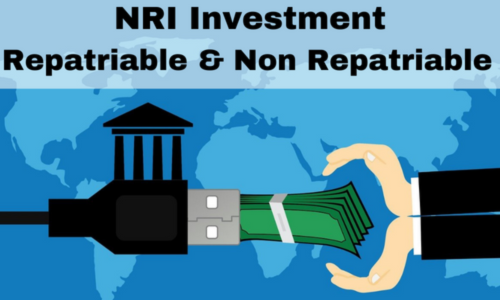Introduction
If you are an NRI (Non-Resident Indian) or an OCI (Overseas Citizen of India) cardholder, you are probably looking to invest in India. With its fast-growing economy and plenty of diverse opportunities, it is undoubtedly one of the most attractive countries to explore. Sometimes, though, the legal framework might just prove to be too tricky to handle. Today, we will consider the legally correct way for NRIs to invest in India regarding the purchase of property and other diverse investments, yet staying relevant to all the regulations in place.
Understanding Repatriable vs. Non-Repatriable Investments
The first thing to be understood here is the difference between repatriable and non repatriable investments.
Repatriable Investments: In contrast, such investments allow NRIs to move their investment returns to his or her country of residence, which would probably make some sense. But this is, of course, subject to strict rules and regulations. For instance, NRIs cannot hold shares in an Indian company on a repatriable basis neither can they make investments or funds available in the form of loans, deposits, etc., in which the principal can be repatriated.

Non-Repatriable Investments: On the contrary, these types of investments involve investing money in India without the intention of taking it back. In essence, the money stays in India permanently. NRIs can form loans, deposits, and make investments on a non-repatriable basis. NRIs have the independence to gather non-repatriable wealth within the country itself.
The Indian government has specific rules to see that NRIs make investments in sectors that align fully with the economic and security policies of the country.
Consult CA Arun Tiwari for more information at 
Key restrictions you should know are as follows:
- Agriculture and Plantation Activities: NRIs cannot invest in companies that deal with agricultural activities, plantation, or farmhouses. This is in an effort to shield the agricultural sector in India and ensure food security for the country.
- Prohibited Sectors: If there is anything prohibited for NRIs to do, you cannot invest in that company. What it means is that, basically, you cannot invest either directly or indirectly in sectors like real estate (except in the purchase of property for personal use), gambling, lotteries, chit funds, and Nidhi companies.
- Indirect Investments: Investing in companies or partnerships that are involved in such restricted activities who by extension seek to circumvent these restrictions is forbidden. Even such indirect investments may be liable for litigation proceedings .
Risks of Non-Compliance Moment
You may think, “So what? I will simply invest in these restricted sectors. Who will even know?” As much as it seems grey, it is crucial to understand the risks.
As it can be seen India has a vast population, so the authorities act in many numbers rather than in single in the case of violations; therefore, one may escape action from authorities but once the crackdown happens, it is stringent as well as widespread. So, better not be a part of such a situation.
The Legal process for Investment in India by NRIs
Now that we have seen the limitations and risks involved, it is time to view what all legal routes NRIs can adopt for investing in India.
1. Purchase of property
Among the areas, one of the favorites of NRIs is to purchase real estate in India. The Indian real estate market offers ample scope for growth, and NRIs can invest in residential or commercial real estate so long as they do not violate the requirements.
Essential Points to Be Considered:
- Residential and Commercial Property: NRIs can buy any number of residential and commercial properties within the country. No provision restricts the number of properties an NRI can own.
- Agricultural Land: Agricultural land, plantation property, and farmhouses are not allowed to be bought by an NRI. Though, they can inherit this type of property.
- Payment Mechanism: All transactions shall be made solely in Indian rupees through banking channels customary to a normal business transaction. NRIs can use funds from either an NRE (Non-Resident External) or NRO (Non-Resident Ordinary) account.
- Home Loans: NRIs can easily take home loans from an Indian bank for property purchase. Payments can be made by them through NRE or NRO account credit, or even through remittances from abroad.
Buying property is a solid investment option that allows NRIs to diversify their portfolio while enjoying the benefits of owning real estate in their home country.
2. Investing in the Stock Market
Another attractive investment is in the stock market of India. NRIs can invest in Indian equities, mutual funds, and bonds, within the purview of the directives of the SEBI and RBI.
Points to Ponder:
- PIS- Portfolio Investment Scheme: NRIs need to open a bank account under the Portfolio Investment Scheme with designated banks for making investments in the Indian stock market. Shares would be purchased and sold from this account. Also, all the necessary guidelines regarding the same would be taken care of.
- Demat Account: The NRIs are required to hold their securities in a Demat account. It can be operated and linked with the above-mentioned PIS account for better accessibility to transactions.
- Compare NRE and NRO Accounts: Repatriable in case of NRE repatriable, Non-repatriable in case of NRO. Account to be opened based on the repatriation requirement.
- Compliance: NRI needs to comply with the guidelines set under FEMA and other regulations of SEBI during the time of making investments.
The NRIs can watch high returns directly in demat form and be a part of the India Growth story through investments in the stock markets of India.

3. Fixed Deposits and Savings Accounts
NRIs can also invest in fixed deposits and savings accounts in India. These are relatively safe investment avenues with stable returns.
Key Points to Consider:
- NRE Fixed Deposits: These deposits are fully repatriable, and the interest income is tax-exempt in India. This is an ideal route for an NRI who desires to repatriate their earnings.
- NRO Fixed Deposits: These deposits have a non repatriable and have an interest income tax. However, the actuality is that NRO accounts are paying more than NRE deposits.
- FCNR Accounts: With an FCNR, the NRIs can have a fixed deposit in foreign currency and yet have their account as wholly repatriable. These accounts also hedge against the fluctuation risks for the currency.
In general, with these investments through fixed deposits and even savings accounts, the NRIs get a safe and stable investment avenue.
4. Business Start-ups
NRI can also set up his business in India, subject to NRI compliances with regulations. This is how NRIs can get through their full entrepreneurial skills and contribute to the economy of India.

Key Points to Consider:
- FEMA Regulations: NRIs must comply with the necessary guidelines of FEMA and other necessary authorities while starting up a business in India.
- Prohibited Sectors: The business should not be any of the prohibited sectors, e.g., agricultural, plantation, or farmhouses.
- Investment Channels: The investments should be made through proper banking channels from NRE, NRO, or FCNR accounts.
Start doing business in India can be a very contented experience because it allows NRIs to harvest growth benefits of the nation.
Conclusion
Doing legal investments in the country in the capacity of an NRI might be an exciting prospect, but such activity is always advisable. In the end, one who knows about the underlying regulations and restrictions can take subsequent actions without falling prey to missteps. Whether you’re deciding to buy property, invest in the stock market, or start a business, following the legal structure will ensure you protect your investment and stay legally compliant.


